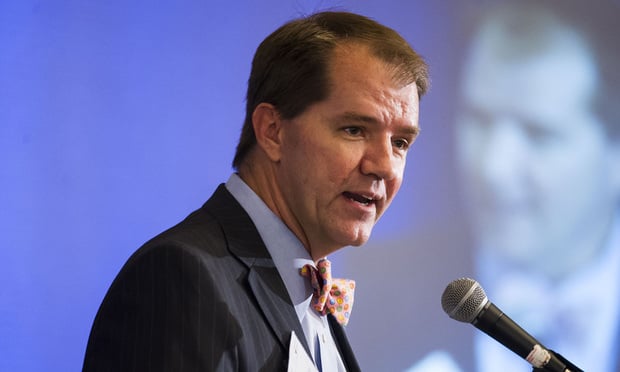From Internet Sensation to Silence: Why Has Texas Supreme Court Justice Don Willett Stopped Tweeting?
For a man who considers himself “the most avid social-media judge in America”, Don Willett's monthlong silence on Twitter is almost deafening.Willett…
October 27, 2017 at 03:01 PM
5 minute read

For a man who considers himself “the most avid social-media judge in America”, Don Willett's monthlong silence on Twitter is almost deafening.
Willett became an internet sensation last year after President Donald Trump, during the election campaign, named the Texas Supreme Court Justice one of 11 people he'd consider naming to the U.S. Supreme Court — even though Willett had jovially mocked Trump in numerous tweets.
All must have been forgiven between the two avid Twitter users because on Sept. 28, Trump nominated Willett to a spot on the U.S. Court of Appeals for the Fifth Circuit.
“No Words,” Willett tweeted that day, thanking Trump from his account which now features a black-robed judge with a cowboy hat riding the blue Twitter bird as if it were a bucking bronco.
And since Sept. 28, Willett hasn't posted a single tweet. There have been no funny musings on the law, no pop culture references, and not a solitary update on the “wee Willetts” — his three young children.
Willett declined to comment about his decision to halt his use of Twitter.
Texas Supreme Court Chief Justice Nathan Hecht notes that the U.S. Department of Justice usually advises judicial nominees not to make public statements while the U.S. Senate is considering confirmation.
“The advice is always to have a low a profile as you can during confirmation process — don't do anything that would draw attention,” said Hecht, nothing the same advice was given to Fifth Circuit Justice Priscilla Owen, who was promoted from the Texas Supreme Court to the Fifth Circuit by then-President George W. Bush in 2005. Willett was later appointed to the Texas high court by then-Gov. Rick Perry to replace Owen.
Evan Young, a partner in the Austin office of Baker Botts who is friends with Willett, said the judicial nominee's absence from Twitter is notable, but understandable.
“Given Justice Willett's prominence on Twitter, his comparative silence Sept. 28 has been widely noted, to put it mildly. But it is not just Twitter silence,” Young said.
Like all nominees for the federal bench, Willett is stepping back from all public speaking — not just tweeting — but speeches, interviews and all other forms of public communication, aside from this work on the Texas Supreme Court, Young said.
“It only seems like a special Twitter limitation because so many people looked forward every day to what would issue forth from @JusticeWillett—and some (including me) are going through withdrawal,” Young said. “But as the Senate considers his and other nominations, it's entirely appropriate for all those nominees to step back and let the nomination process run its course.”
Willett, who likes to keep his tweets lighthearted and humorous, has two cardinal rules about the medium: He never discusses cases that may come before him and he refuses to engage in what he calls “political bomb throwing.” He primarily tweets to educate the public about the judiciary and to raise his own profile in a state where judges must run for office and judicial name I.D. among voters is extremely low.
“People are genuinely amazed that a nerdy judge can be engaging, and believe me, my geekery is on an uber-elite level. But it's rare for a Supreme Court Justice to step out from behind the bench and demystify things,” Willett told Texas Lawyer in an interview last year.
“I began using Twitter as a political communications tool, but over time it's become my primary news feed — the best way to stay abreast of warp-speed happenings in the world and to enjoy the musings of smart, fascinating people. Twitter is a neat, one-stop compilation of smart, incisive viewpoints on every imaginable topic from a riveting cross-section of folks,” Willett said in that interview.
Assuming Willett is confirmed by the U.S. Senate, many of his followers wonder if the new Fifth Circuit Justice will pick his Twitter handle up where he left off.
“That is the million-dollar question,” said Brantley Starr, a deputy Texas attorney general who served as Willett's first law clerk on the high court.
“It's a close call. The reason he tweets now is completely understandable by structure,” noting that Willett uses his account to raise both his political profile and educate the public about the life of a judge.
But federal judges are more isolated from the public and rarely use Twitter, Starr said. However, some public contact among federal judges is encouraged, including teaching at law schools and giving public speeches about the judiciary, he said.
“The structural incentive is not the same,” Starr said of the potential for Willett tweeting as a Fifth Circuit judge. “Maybe it's so ingrained in his DNA. I could see him tweeting, maybe less, or maybe not at all.''
Dallas appellate lawyer David Coale is doubtful that Willett's Twitter use with be the same should he join the Fifth Circuit.
“On the federal bench it's radio silence because nobody tweets. And if you're the new guy you don't want to come in blazing tweets,” Coale said. “He works and play wells with others.”
Coale, who also follows Willett on Twitter, said he misses the justice's tweets.
“I wonder how the wee Willetts are doing?” Coale asked. “I hope they are doing well.''
This content has been archived. It is available through our partners, LexisNexis® and Bloomberg Law.
To view this content, please continue to their sites.
Not a Lexis Subscriber?
Subscribe Now
Not a Bloomberg Law Subscriber?
Subscribe Now
NOT FOR REPRINT
© 2025 ALM Global, LLC, All Rights Reserved. Request academic re-use from www.copyright.com. All other uses, submit a request to [email protected]. For more information visit Asset & Logo Licensing.
You Might Like
View All
Ex-Appellate Court Judges Launch Boutique Focused on Plaintiffs Appeals
2 minute read
Supreme Court Considers Reviving Lawsuit Over Fatal Traffic Stop Shooting

Overtime Rewind: Texas Court Ruling Unravels FLSA Salary Level Increases
4 minute read
Divided 5th Circuit Shoots Down Nasdaq Diversity Rules
Trending Stories
- 1Bass Berry & Sims Relocates to Nashville Office Designed to Encourage Collaboration, Inclusion
- 2Legaltech Rundown: McDermott Will & Emery Invests $10 Million in The LegalTech Fund, LexisNexis Releases Conversational Search for Nexis+ AI, and More
- 3The TikTokification of the Courtroom
- 4New Jersey’s Arbitration Appeal Deadline—A Call for Clarity
- 5Law Firms Look to Gen Z for AI Skills, as 'Data Becomes the Oil of Legal'
Who Got The Work
J. Brugh Lower of Gibbons has entered an appearance for industrial equipment supplier Devco Corporation in a pending trademark infringement lawsuit. The suit, accusing the defendant of selling knock-off Graco products, was filed Dec. 18 in New Jersey District Court by Rivkin Radler on behalf of Graco Inc. and Graco Minnesota. The case, assigned to U.S. District Judge Zahid N. Quraishi, is 3:24-cv-11294, Graco Inc. et al v. Devco Corporation.
Who Got The Work
Rebecca Maller-Stein and Kent A. Yalowitz of Arnold & Porter Kaye Scholer have entered their appearances for Hanaco Venture Capital and its executives, Lior Prosor and David Frankel, in a pending securities lawsuit. The action, filed on Dec. 24 in New York Southern District Court by Zell, Aron & Co. on behalf of Goldeneye Advisors, accuses the defendants of negligently and fraudulently managing the plaintiff's $1 million investment. The case, assigned to U.S. District Judge Vernon S. Broderick, is 1:24-cv-09918, Goldeneye Advisors, LLC v. Hanaco Venture Capital, Ltd. et al.
Who Got The Work
Attorneys from A&O Shearman has stepped in as defense counsel for Toronto-Dominion Bank and other defendants in a pending securities class action. The suit, filed Dec. 11 in New York Southern District Court by Bleichmar Fonti & Auld, accuses the defendants of concealing the bank's 'pervasive' deficiencies in regards to its compliance with the Bank Secrecy Act and the quality of its anti-money laundering controls. The case, assigned to U.S. District Judge Arun Subramanian, is 1:24-cv-09445, Gonzalez v. The Toronto-Dominion Bank et al.
Who Got The Work
Crown Castle International, a Pennsylvania company providing shared communications infrastructure, has turned to Luke D. Wolf of Gordon Rees Scully Mansukhani to fend off a pending breach-of-contract lawsuit. The court action, filed Nov. 25 in Michigan Eastern District Court by Hooper Hathaway PC on behalf of The Town Residences LLC, accuses Crown Castle of failing to transfer approximately $30,000 in utility payments from T-Mobile in breach of a roof-top lease and assignment agreement. The case, assigned to U.S. District Judge Susan K. Declercq, is 2:24-cv-13131, The Town Residences LLC v. T-Mobile US, Inc. et al.
Who Got The Work
Wilfred P. Coronato and Daniel M. Schwartz of McCarter & English have stepped in as defense counsel to Electrolux Home Products Inc. in a pending product liability lawsuit. The court action, filed Nov. 26 in New York Eastern District Court by Poulos Lopiccolo PC and Nagel Rice LLP on behalf of David Stern, alleges that the defendant's refrigerators’ drawers and shelving repeatedly break and fall apart within months after purchase. The case, assigned to U.S. District Judge Joan M. Azrack, is 2:24-cv-08204, Stern v. Electrolux Home Products, Inc.
Featured Firms
Law Offices of Gary Martin Hays & Associates, P.C.
(470) 294-1674
Law Offices of Mark E. Salomone
(857) 444-6468
Smith & Hassler
(713) 739-1250






